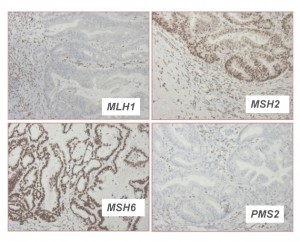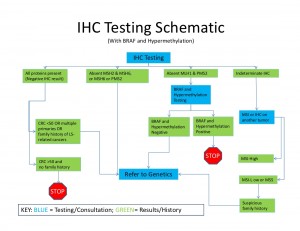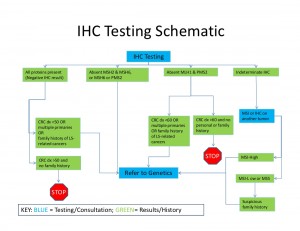 Tumors from people with Lynch Syndrome are likely to demonstrate loss of mismatch repair protein expression. Immunohistochemistry (IHC) testing can be performed on tumor tissue to analyze mismatch repair protein function. The pattern of loss observed can provide information about which gene is not functioning properly. As a result, IHC can be helpful both in providing information about the likelihood of Lynch Syndrome and in directing testing for a germline mutation to a specific gene.
Tumors from people with Lynch Syndrome are likely to demonstrate loss of mismatch repair protein expression. Immunohistochemistry (IHC) testing can be performed on tumor tissue to analyze mismatch repair protein function. The pattern of loss observed can provide information about which gene is not functioning properly. As a result, IHC can be helpful both in providing information about the likelihood of Lynch Syndrome and in directing testing for a germline mutation to a specific gene.
PowerPoint: Lynch Syndrome screening with IHC
IHC Fact Sheets
| Colorectal IHC Provider Fact Sheet | Colorectal IHC Patient Fact Sheets | Endometrial IHC Provider Fact Sheet |
|---|---|---|
IHC Procedures
| With BRAF or Methylation | Without BRAF or Methylation |
|---|---|
 |
 |
OSU clinical MMR IHC procedures
IHC Results
Heterodimer pairings of mismatch repair proteins hold the key to interpreting the results from IHC testing.
MLH1 and PMS2 form a heterodimer. MLH1 forms heterodimers with other mismatch repair proteins as well, but PMS2 only binds with MLH1. As a result, loss of MLH1 function will automatically lead to loss of PMS2 staining because it doesn’t have its binding partner. The reverse is not true, however, because MLH1 can still bind with one of its other partners.
MSH2 and MSH6 form another heterodimer. Like MLH1, MSH2 sometimes forms a heterodimer with other mismatch repair proteins. Like PMS2, MSH6 only binds with MSH2. Loss of MSH2 function will therefore automatically lead to loss of MSH6 staining, but not vice versa.
Typically, IHC staining for the mismatch repair proteins is interpreted as follows:
- Loss of MLH1 and PMS2 protein staining may indicate a germline MLH1 mutation or somatic MLH1 promoter hypermethylation; additional testing (BRAF V600E mutation analysis or MLH1 hypermethylation analysis) may be useful in distinguishing between these possibilities
- Loss of PMS2 protein staining usually indicates a germline PMS2 mutation
- Loss of MSH2 and MSH6 protein staining usually indicates a germline MSH2 mutation
- Loss of MSH6 protein staining usually indicates a germline MSH6 mutation
Unfortunately, interpreting IHC results is not always this straightforward; see the common dilemmas section for more information on difficult situations.
| Sample Pathology Reports | Interpreting Results | Normal Results | Abnormal Results |
|---|---|---|---|